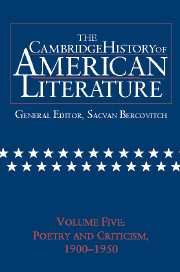5 - Ezra Pound
from MODERNIST LYRIC IN THE CULTURE OF CAPITAL
Published online by Cambridge University Press: 28 March 2008
Summary
Among modernists of the English-speaking world, not even Joyce achieved the infamy and authority of Ezra Pound, who inaugurated his career with an act of expatriation in 1908 after being fired earlier that year from his teaching post at Wabash College in Crawfordsville, Indiana. One bitter winter night (so it goes in Pound's telling), Pound gave his bed to a homeless male impersonator, so that he might “bring warmth to her frozen body,” while he slept on the floor, fully clothed, wrapped in his topcoat. The president of Wabash and Pound's landlady were not amused.
About two years later, in the summer of 1910, Pound returned home in an unsuccessful effort to acquire another teaching post, this time at his alma mater, the University of Pennsylvania. That winter he spent considerable time in New York City pondering the literary scene and gathering the impressions and notes for “Patria Mia,” his single most important piece of literary and social criticism, which he would publish in 1913 in the New Age when he was twenty-eight. Early in 1911 he left America for good, returning to London until 1920, a period during which he became the leading international instigator of a new poetry and poetics, the unofficial agent and publicist for Frost, Eliot, Joyce, H. D., and Wyndham Lewis (among others), and the foreign editor and correspondent of arguably the two most important of the little magazines of the period, Poetry (Chicago) and The Little Review.
- Type
- Chapter
- Information
- The Cambridge History of American Literature , pp. 131 - 173Publisher: Cambridge University PressPrint publication year: 2003



